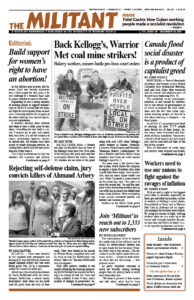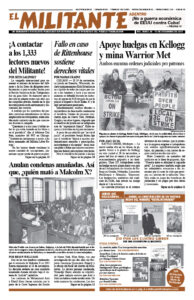SYDNEY — Prime Minister Scott Morrison announced Nov. 25 that he was sending Australian imperialist police and military to “provide security and stability” by suppressing anti-government demonstrations in the Solomon Islands, some 1,000 miles northeast in the South Pacific.
For several days protests in the capital city, Honiara, on Guadalcanal island, calling for the resignation of Prime Minister Manasseh Sogavare, had grown increasingly violent. Chinese-owned shops and businesses were targeted. Three people died in fires. Sogavare had asked for Canberra to send troops.
Opposition to the Sogavare government has been fueled by worsening economic conditions, but was triggered by frictions over Honiara’s growing economic ties with Beijing. While Beijing is the Solomon Islands’ biggest trading partner, Australia is its second biggest source of imports.
A special response group of 23 Australian Federal Police hit the ground in Honiara Nov. 26. Another 50 followed to “guard critical infrastructure assets,” as well as 43 Australian troops to “protect Honiara’s airport.” The governments of Papua New Guinea, Fiji and New Zealand are contributing scores more personnel to the Australian-led “peacekeeping” forces.
Australian cops moved to help break up the demonstrations and impose a nighttime curfew. Over 100 people have been arrested.
Canberra’s intervention was supported by the Labor Party opposition in Parliament and welcomed by bourgeois commentators here. “Nothing could be more directly in Australia’s national interests,” wrote Greg Sheridan, foreign editor of the Australian, than “preserving regional stability and limiting undue Chinese influence in the South Pacific.”
The Australian rulers regard this region as part of their imperial sphere of influence and view Chinese investment and influence here as a threat. Canberra’s intervention in the Solomons comes in the wake of the signing of the AUKUS military pact between the imperialist rulers of the U.S., Australia and the U.K. aimed at curbing Beijing’s growing economic clout and military ambitions in the Pacific.
Drawing increased attention from Washington and Canberra, the rulers of China, and Taiwan — which Beijing claims over the objection of Washington — have stepped up competition in the South Pacific for influence. In 2019 the government of the Solomon Islands broke diplomatic ties with Taipei in favor of Beijing.
Daniel Suidani, premier of Malaita, the most populous of the Solomon Islands, opposed the country establishing diplomatic relations with Beijing and has maintained close relations with Taipei.
Suidani opposed Australia sending police and troops to the Solomons, saying it was “an internal matter.” The majority of those involved in the current demonstrations are reported to have come from Malaita. Worsening economic conditions, especially rising joblessness, helped spur the protests.
Solomon Islands, with a population of close to 700,000, is one of the least developed nations in the world. The majority of its people make a precarious living from subsistence farming and fishing. Conditions have worsened in the last couple of years through enforced isolation due to the COVID pandemic.
Conflict between the Malaita administration and the central government on Guadalcanal goes back many years in that former British colony. After two decades of depression conditions and unequal development, a civil war erupted in 1998 between rival militias from the two islands.
Australia and New Zealand, the two imperialist powers in the region, launched interventions in 2000 and again in 2003. Hundreds of Australian troops were deployed in the Solomon Islands and remained there as part of a so-called Regional Assistance Mission until 2017. The expensive operation strengthened Canberra’s hand but left working people there no better off.

